The impact of the COVID-19 pandemic on the implementation of local government by citizens on the example of elections and referenda during the term of office in Poland
Pages: 133-155
Edition: Lublin 2022
DOI: https://doi.org/10.36874/RIESW.2022.3.6
Citation method: M. Klonowski, M. Onasz, Wpływ pandemii COVID-19 na realizację samorządu przez obywateli na przykładzie wyborów i referendów w trakcie kadencji w Polsce, „Rocznik Instytutu Europy Środkowo-Wschodniej” 20(2022), z. 3, s. 133-155, DOI: https://doi.org/10.36874/RIESW.2022.3.6.
Keywords: local democracy, local elections, local referendum, mid-term elections, pandemic
Abstract: The article is an attempt to estimate the impact of the COVID- 19 pandemic on the course of local elections and referenda in Poland. All election processes (i.e. supplementary, re-election and early elections) as well as local referenda that took place from the last local government election in October 2018 until May 15, 2021, i.e. until the formal lifting of the state of the epidemic in Poland, were taken into account. The authors are trying to check to what extent the pandemic limited the freedom to implement the idea of self-government among the inhabitants, how much longer was the waiting period for the successors of those local government officials who for some reason lost their seats, and how much more difficult it was for the inhabitants to hold referendums.
Bibliography:
Alacio García R.Y., Organización de elecciones mundiales y acontecimiento sanitario de 2020, „Utopia y praxis Latinoamericana” 2020, no. EXTRA 8, s. 52-72, DOI: https://doi.org/10.5281/zenodo.4081874.
Amrurobbi A.A., Sutrisno E.L., Local elections Turing the Covid-19 Outbreak: Inclusivity and Challenges for Voters with Disabilities, „Politicon” 2022, no. 4(1), s. 17-52, DOI: https://doi.org/10.15575/politicon.v4i1.16142.
Clark A., James T.S., Britain: postponement, complexity ans sub-national elections in the COVID-19 pandemic, https://www.idea.int/sites/default/files/britain-postponement-complexity-and-sub-national-elections-in-the-covid-19-pandemic-en.pdf.
Coll J., Waiting to vote safety: How Covid-19 safety measures shaped in-person voter wait times during the 2020 election, „Social Science Quarterly” 2022, no. 103(2), s. 380-398, DOI: https://doi.org/10.1111/ssqu.13124.
Grogan J., Donald A., Routledge Handbook of Law and the COVID-19 Pandemic, London 2022, DOI: https://doi.org/10.4324/9781003211952.
International IDEA, Global overview of COVID-19: Impact on elections, https://www.idea.int/news-media/multimedia-reports/global-overview-covid-19-impact-elections.
James T.S., New Development: Running elections during a pandemic, „Public Money & Management” 2021, no. 41(1), s. 65-68, DOI: https://doi.org/10.1080/09540962.2020.1783084.
Jańczuk L., Samorząd terytorialny w stanach nadzwyczajnych. Ujęcie ustrojowe, „Rocznik Instytutu Europy Środkowo-Wschodniej”, 14(2016), z. 5, s. 363-374.
Johnson A.F., Pollock W., Rauhaus B., Mass Casualty Event Scenarios and Political Shifts: 2020 Election Outcomes and the U.S. COVID-19 Pandemic, „Administrative Theory and Praxis” 2020, no. 42 (2), s. 249-264, DOI: https://doi.org/10.1080/10841806.2020.1752978.
Kajcsa A., Elections In Romania during COVID-19. An analysis through the perspective of the extralegal sources of law, „Juridical Current” 2021, no. 4, s. 13-20.
Kancik-Kołtun E., Poczucie bezpieczeństwa zdrowotnego obywateli podczas pandemii COVID-19 w państwach Grupy Wyszehradzkiej, „Rocznik Instytutu Europy Środkowo-Wschodniej”, 19(2021), z. 1, s. 213-237. DOI: https://doi.org/10.36874/RIESW.2021.1.12.
Landman T., Di Gennaro Splendore L., Pandemic Democracy: Elections and COVID-19, „Journal of Risk Research” 2020, no. 23(7-8), s. 1060-1066, DOI: https://doi.org/10.1080/13669877.2020.1765003.
Mazurkiewicz M., Wybory niekonkurencyjne w Polsce na poziomie lokalnym – wstępne oceny, „Studia Regionalne i Lokalne” 2020, nr 79(1), s. 97-113, DOI: https://doi.org/10.7366/1509499517905.
Michalak B., Koronawirus a wybory prezydenckie. Czym grozi głosowanie podczas pandemii?, https://www.batory.org.pl/upload/files/Programy%20operacyjne/Forum%20Idei/B_Michalak_Koronawirus%20a%20wybory.pdf.
Musiał-Karg M., Głosowanie korespondencyjne podczas pandemii Covid-19. Doświadczenia z polskich wyborów prezydenckich 2020 r., „Przegląd Prawa Konstytucyjnego” 2021, nr 2(60), s. 31-48, DOI: https://doi.org/10.15804/ppk.2021.02.02.
Noury A., François A., Gergaud O., Garel A., How does COVID – 19 affect electoral participation? Evidence from the French municipal elections, „PLoS ONE” 2021, no. 16(2), DOI: https://doi.org/10.1371/journal.pone.0247026.
Onasz M., Quality of democratic election process during the COVID-19 pandemic: the Schedler’s chain of democratic choice perspective, „Athenaeum” 2021, no. 72(4), s. 188-210, DOI: https://doi.org/10.15804/athena.2021.72.11.
Pelguta J., Levinsky R., Škoda S., Do elections accelerate the COVID-19 pandemic?, „Journal of Population Economics” 2022, no. 35, s. 197-240, DOI: https://doi.org/10.1007/s00148-021-00870-1.
Piękoś K., Hadała-Skóra A., Wybory parlamentarne w okresie pandemii COVID-19 na przykładzie Trynidadu i Tobago, „Polityka i Społeczeństwo” 2021, nr 4(19), s. 117-129, DOI: https://doi.org/10.15584/polispol.2021.4.9.
Pop I.D., COVID-19 crisis, voters’ drivers, and financial markets consequences on US residential election and global economy, „Finance Research Letters” 2022, no. 44, s. 1-8, DOI: https://doi.org/10.1016/j.frl.2021.102113.
Squire P., Uncontested Seats in State Legislative Elections, „Legislative Studies Quarterly” 2000, no. 25(1), s. 131-146, DOI: https://doi.org/10.2307/440396.
Sula P., Madej M., Błaszczyński K., In the shadow of plagues: 2020 presidential elections in Poland, „Przegląd Politologiczny” 2021, nr 3, s. 27-45, DOI: https://doi.org/10.14746/pp.2021.26.2.3.
Tatarczyk D., Wojtasik W., The Incumbency Advantage during the COVID-19 Pandemic: Examining the 2020 Polish Presidential Election, „East European Politics and Societies” 2022, DOI: https://doi.org/10.1177/08883254221085307.
Weibrecht N., Rößler M., Bicher M., Emrich Š., Zauner G., Popper N., How an election can be safely planned and conducted during a pandemic: Decision support based on a discrete event model, „PLoS ONE” 2021, no. 16(12), DOI: https://doi.org/10.1371/journal.pone.0261016.
Żelichowski R., Polityka w cieniu korona wirusa. Wybory parlamentarne w Królestwie Niderlandów, „Politeja” 2021, nr 18 (75), s. 119-141, DOI: https://doi.org/10.12797/Politeja.18.2021.75.06.

PDF: Download